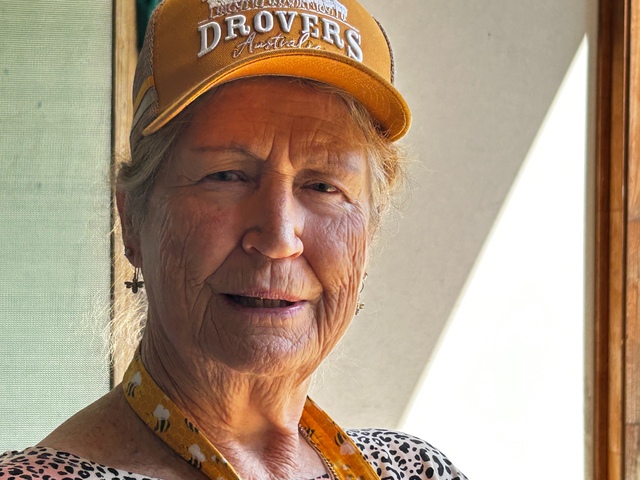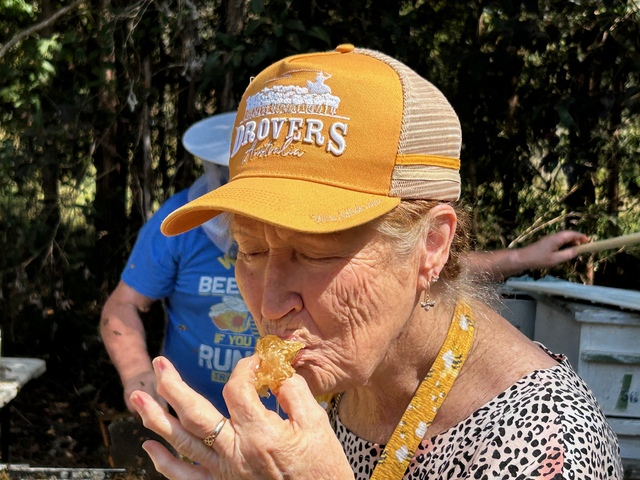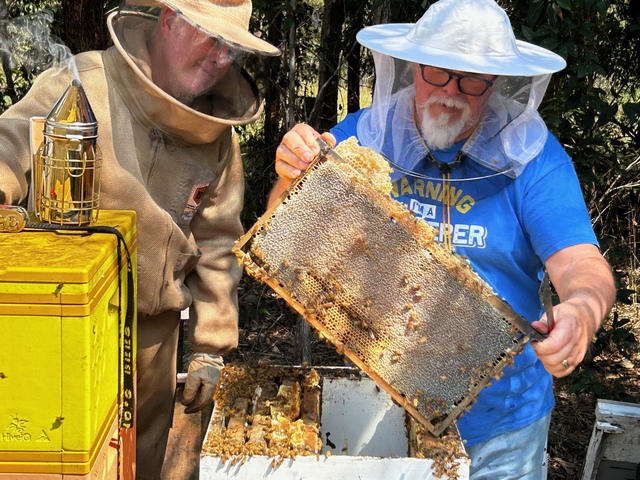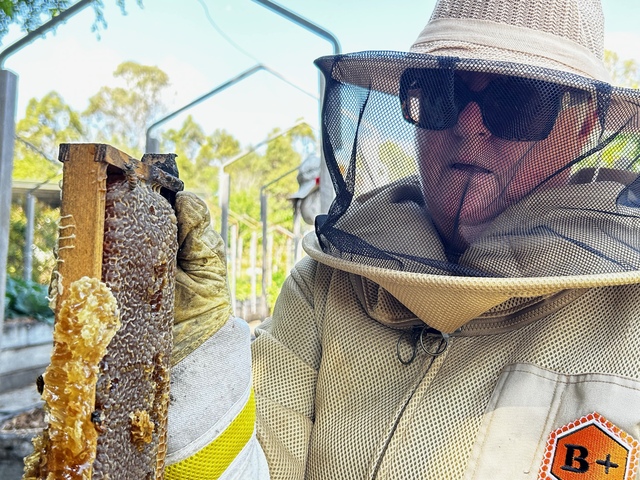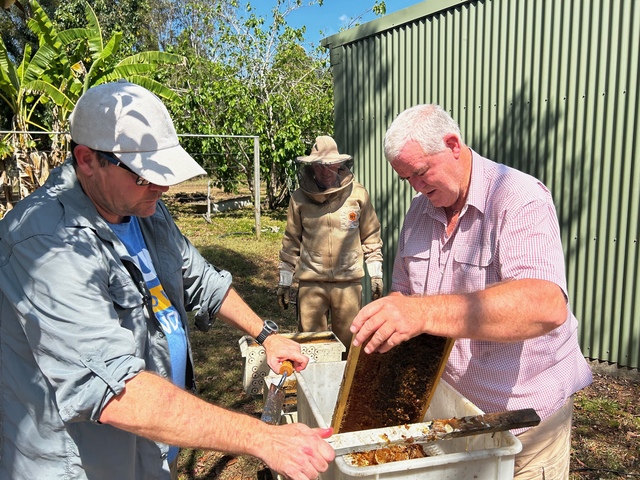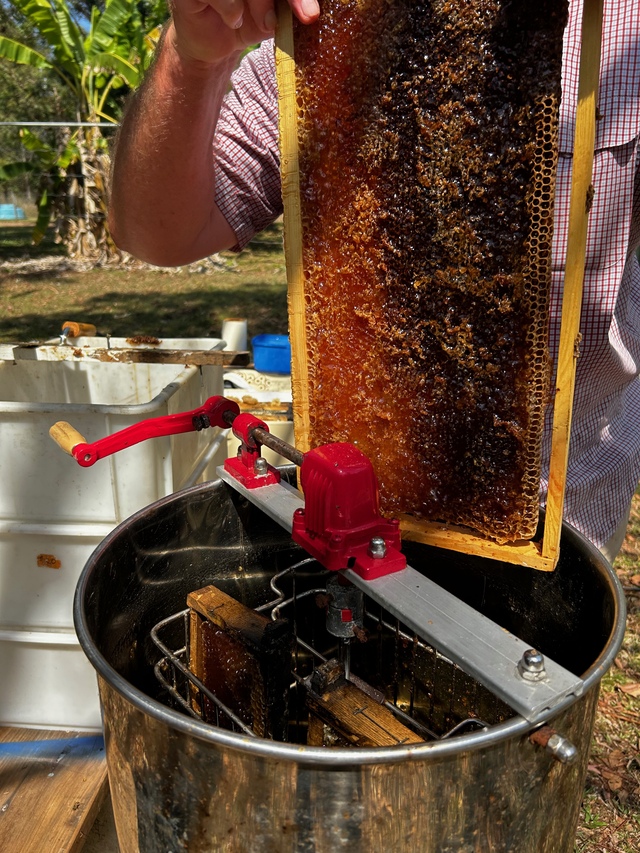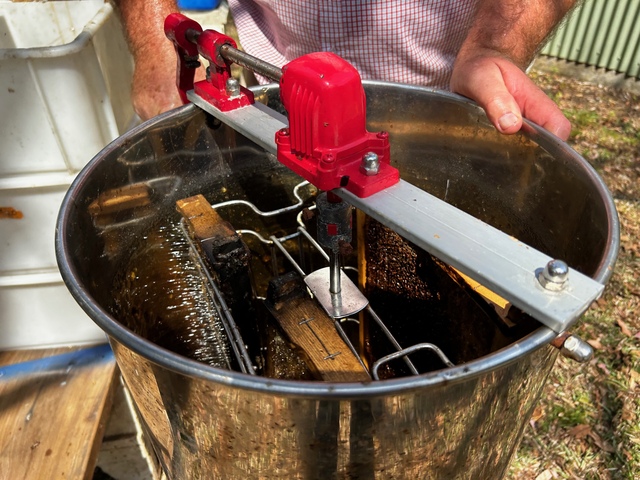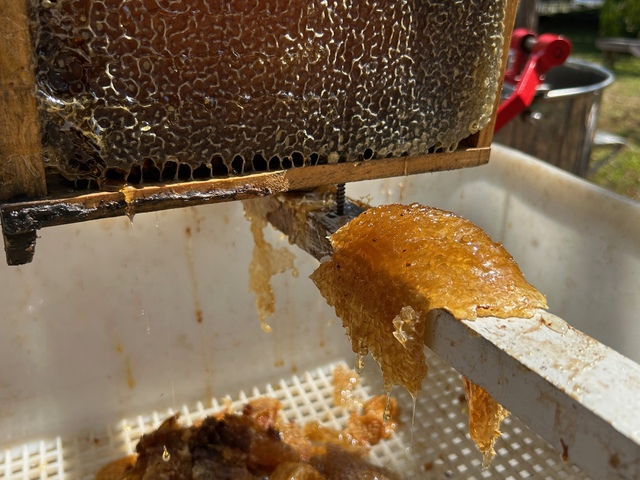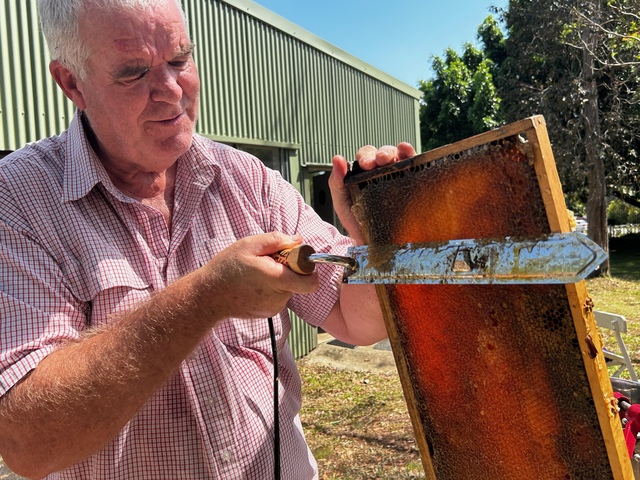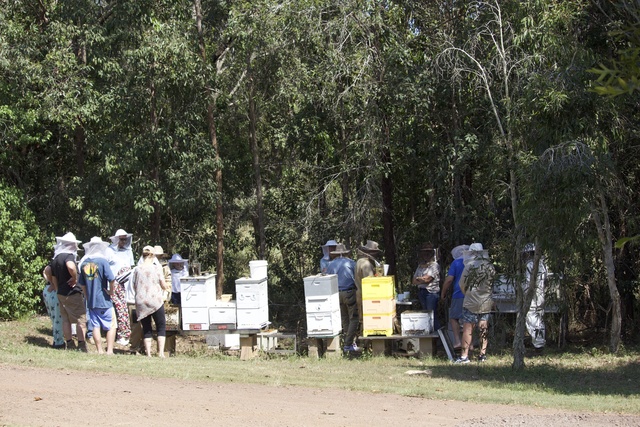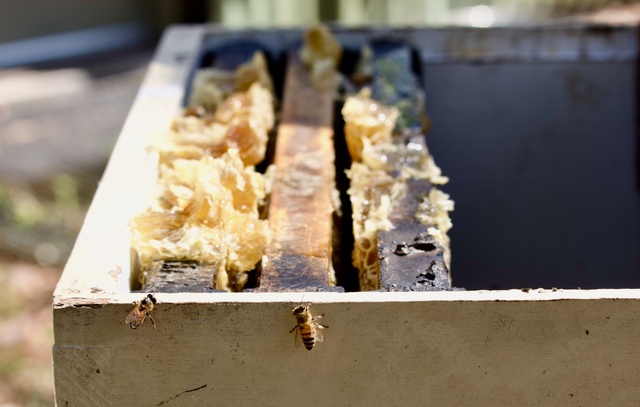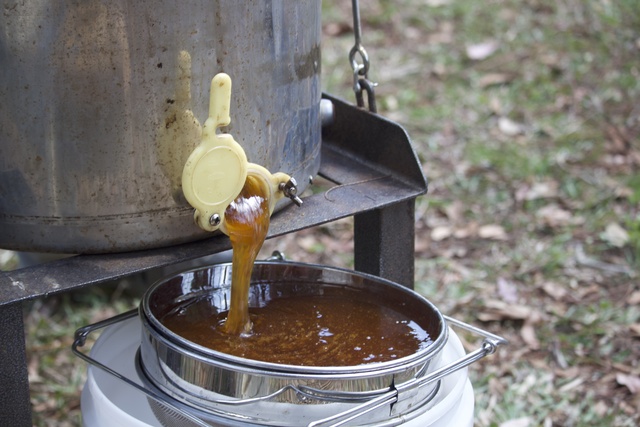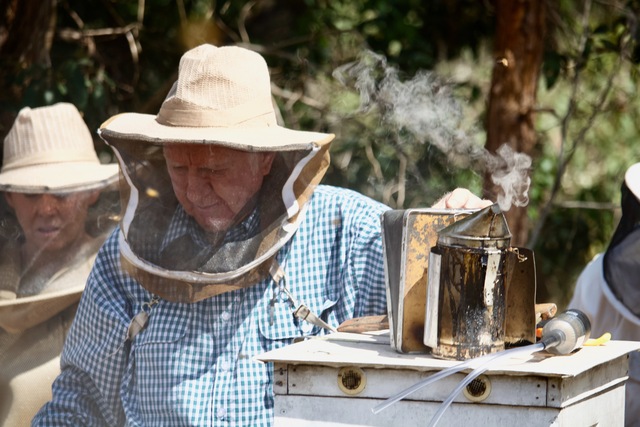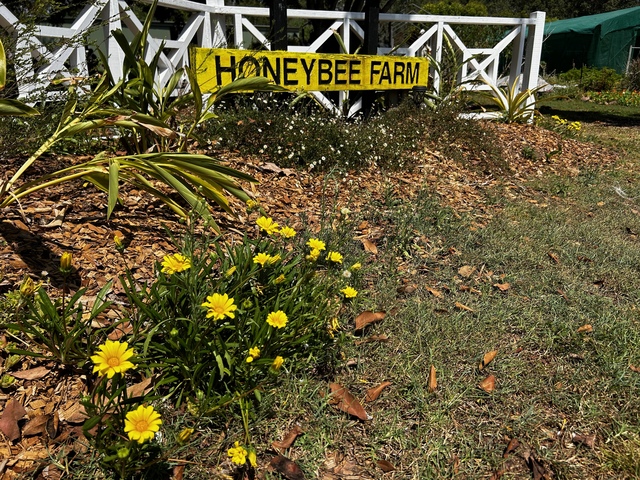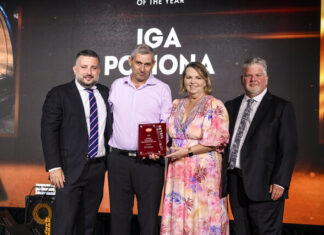The value of honey for our health is widely known, but what about the bees? ERLE LEVEY gets up close with these amazing creatures that we depend on for our survival.
“Mum used to say to me ’If you’re not up a tree you’re in a cloud’.”
We know that bees play an important part in nature but we don’t necessarily understand how vital they are for our everyday survival.
We know that honey has many health benefits, whether eaten or applied to various ailments and injuries. It does not deteriorate over time.
Yet what about bees? How do they impact everyday life?
That is why I was at Kandanga on a Saturday morning … to find out more about these amazing insects.
“You’re not allergic to bee stings are you?’’
That was a question asked of me when I visited Valley Bees, a self-help group of beekeepers that has been active for almost 14 years.
The group meets on the third Saturday of each month at Happy Bee Wellness Resort – and on the first Saturday at Gympie Landcare.
Valley Bees president Pauline Alexander took me down to the hives where the group had gathered, to check on the bees and take the frames out to extract the surplus honey.
I had bees on my arms as well as in my hair, while taking photos and talking with club members.
Pauline had given me some fresh honeycomb from a hive to try … and the honey was running down my fingers, attracting more bees.
“We started in February 2011,’’ Pauline said. “We had people wanting to know about bees and beehives, so about six of us got together. Athol Craig was the instigator.
“We started at the Kandanga Hall and were expecting 40 or 50 people but got 88 at the first meeting. There were people from Gympie and the wider area – Hervey Bay, Bundaberg, Noosa.
“They came from everywhere – everyone was interested in native bees.’’
The late Athol Craig is now remembered as patron of the club.
He and Pauline kept getting phone calls from people asking about different aspects of the bees – honeybees and native bees.
“They wanted to learn – they didn’t know enough about them.
“They wanted hives but weren’t sure what to do.
“We were a group of friends and most had European bees as well as some native hives.
“People wanted to know could they just start up a hive?
“They just put a box down and the bees go into it … that’s how it all begins.’’
By this time we were up at the shed having a cup of tea and home-made lemon cake.
That’s when our conversation took another interesting turn.
There are times in life when you cannot anticipate what you are going to find when you take the time to look and to listen.
Everyone has a story to tell of their life and Pauline just amazed me as she talked about growing up in the Australian bush, about the people you meet along the way, about the resilience of the generations before us and the impact they can have on the landscape.
“I grew up out west, at Blackall. I was born in Barcaldine but lived in Blackall.
“My mum and dad were drovers. I was based there until I was six.
“We never lived in a house early on, as we were always on the road. As children, we had to go into town and board because we needed to go to school.
“There were nine of us. Mum taught the older ones and then by the time we were 13, we had to go out and work but did our schoolwork in the afternoon.
“We’d come across beehives and this Aboriginal man working with us showed how to poke a stick into the beehive and bring out the honey and eat it.
“That was the start of it. I really liked the way they did it without disturbing the beehive itself … we didn’t destroy it.
“We just poked down and got enough honey to eat, and that was it.’’
Pauline came to Gympie when she was 16 and met a beekeeper, remaining friends with that family for quite a while.
“I ended up meeting another beekeeper and we’ve been together 32 years. Norm Salt.
“We had Salties fish and chips at Imbil for a number of years.’’
Barcaldine has a sense of history with shearers and those who worked on the land or in the sheds.
For Pauline, she was born in a horse-drawn dray beneath the Tree of Knowledge which was in the centre of town and where Australian shearers went on strike in 1891.
“That’s where Mum and Dad told me I was born. They were on the way to the hospital.
“We used to always picnic under the tree. When it was destroyed I was heartbroken.
“When we finished droving, we went to the Blackall Wool Scour, and lived and worked there. That was our playground.
“The lanolin from the wool was good for our skin. We used to skate on it but had to be very careful as it was thicker on the outside and thinner in the middle.
“We went in bare feet and didn’t have trouble with them for a long time because of the oil. You couldn’t get the smell out – that was the trouble.
“My oldest brother and I – there were still five kids under us – we would look after the baby.
“He was the bottle-maker for the milk. The baby would be crying and I would be trying to keep the baby quiet.
“Where’s the bottle?’’ I would ask.
“Oh, I drank it,’’ he said. “I kept testing it all of the time.’
“He had run out of milk, so we had to start again.
“We would help Mum milk 30 cows as we had to supply the milk for the shearers and wool scour workers.
“We milked them by hand. We would take a billy over and a cup – filling the billy and then drinking the cup on the way back.’’
The Tree of Knowledge is still there in Barcaldine but in an award-winning architectural form.
In another twist, Pauline’s mother is commemorated in the Trucking Wall of Fame for her role later in life.
Born to dairy farmer parents at Urbenville, New South Wales, Jacqueline Baldwin was nicknamed Johnny long before she started school.
Having worked hard most of her life, she became known far and wide as Lady John Southern.
Lady John began driving a truck carting firewood which she and her then husband, Colin Palmer, cut around Blackall.
At Gympie, Pauline worked in the old Golden Fleece service station out at Monkland.
Her grandma lived where Lincraft now is established and Pauline came to look after her.
When she got married they had a milk run from farms in the Mary Valley into the Wide Bay Dairy Co-op in Tozer St.
“Calico Creek, Mooloo, Brooloo, all around. That was our milk run – Langshaw as well.
“In the afternoon we picked up fruit and vege and brought it into the railway. We did that for quite a few years.’’
Pauline then had to raise their three children on her own and went back to the night shift at the service station.
After working at Central School for quite a few years, she met Norm and they ran Salties at Imbil for 12 years – where the bakery now operates.
Norm was itching to get back into bees, Pauline said. He had always been involved since the age of 17.
“An uncle had bees over at Conondale and his mother would say he would go down and sit in the grass all day watching the bees.
“You always knew where he was. There was a fascination with the workings of them.
“We used to do that when we were young. With the Aboriginal kids, we would lie on the ground and watch the bees go in and out.
“It was a fascination with nature. Bees, butterflies and ants.
“We would watch the clouds, see what you could make out of the shapes.
“Mum used to say to me ’If you’re not up a tree you’re in a cloud’.’’
As for the beekeeping, Pauline really enjoys it but they need constant care – making sure they have water, and they have food, as well as tending the hives.
“I always say they are like children – you have to nurture them.
“The hard work is the lifting of the beehives. When we started full time we only had ourselves to lift but now we have a loader.
“After we sold the shop, we would go out west and camp in order to look after the bees and the hives.
“We were looking for the blossoms out there – there is beautiful ironbark.
“Summer time would get so hot … we were at Surat one year and the honeycomb just all melted. We lost the honey and the bees.
“It’s what happens when it gets too hot. You just have to be careful.
“Don’t leave too much honey on the hives or they get too heavy and collapse.
“At the same time don’t take too much in case of prolonged wet weather as it leaves the bees with no food.’’
Honey Bee Wellness Retreat opened about 2016 and the bees help with the pollinating of the farm and gardens while Valley Bees harvest the honey.
To collect just 1kg of honey, honeybees will need to make about 150,000 flights.
They will fly between 250,000 to 450,000km
– that’s the equivalent of more than 10 times around the world – and visit more than one million flowers.
A strong productive beehive has between 30,000 and 50,000 bees.
“The club is about getting people together, talking,’’ Pauline said, “sharing ideas and information.
“There is free information but also a social aspect … it gets people out and talking. So there is physical and mental activity.
“Each year we have an open bee day, at Mary Valley State College late in August.
“On GourMay festival day in Imbil I did a display of honey at the RSL Hall. It’s amazing how many people we get coming in and just asking questions about bees and to buy honey.
“There are so many health benefits of honey but just being around bees gives you patience, and a broader understanding.
“You have to be gentle, you have to nurture them. And it gives you a satisfaction. It calms you down.
“You have to be calm around bees. Once you get uptight, the bees come buzzing.
“They can smell tension. And as sure as eggs you will get stung.
“It’s the same with cattle, you have to be calm. Dad used to say to sing, whistle … don’t yell and shout.
“Once you do, the cattle panic.’’
Singing to cattle brought up the role travelling entertainers played in keeping Outback Australia connected.
Entertainers such as Slim Dusty and Joy McKean, Barry Thornton, Smoky Dawson and Buddy Williams.
“When my mother was a child she and Slim Dusty used to play on the railway line at Kempsey.
“When they would come to Blackall with their travelling show, we would take them to our orchard and give them oranges and lemons for their throats.
“When we camped at night, Dad would always have some music on the radio for the cattle.
“We had an old fellow who had a harmonica, and he used to play at night. Many nights I would go to sleep listening to that.’’
The health of bees world-wide is under a cloud through a range of issues from pesticides and parasites, to overworking them on crops such as almonds and canola.
They lose a lot of energy when they come off those crops, Pauline said, so you have to put them somewhere and let them build themselves back up.
Varroa mites are a major threat to bee colonies and need to be self-managed.
“I think it’s been contained in Brisbane but New South Wales has been devastated,’’ Pauline said. “They panicked. We should learn from that.
“There is no need to over-react but it needs constant monitoring. There is no need to burn everything.
“Every other country in the world has this problem, even New Zealand.
“We have to learn to live with it. Isolate those hives affected. There is treatment that every beekeeper should be doing – test a few hundred bees rather than lose the hive.’’
The Valley Bees workshops remind about the importance of sourcing local honey straight from the hive rather than having been altered in some way.
Being aware of the environment and how to encourage bees is just as important – all native trees are good for the environment and the bees.
Yet perhaps the biggest threat is under-valuing them and the work they do.
“Without bees we will have very little food,’’ Pauline said.
“People don’t realise that. You need the bees to grow your food.
“A lot of people say ‘what do you mean, they’re a bee – they only give honey.’
“They don’t understand the basics of nature.’’
Pauline is a life member of Queensland Beekeepers Association and goes to the schools to talk about bees.
“It’s just a way of life. A good way of life as far as I’m concerned.
“I don’t know what I’d do if I didn’t have any bees to worry about.
“I don’t wear a veil or a suit … only if it’s windy. They don’t like that so much. They can be blown into you.
“They don’t like cloudy days or windy weather. It upsets them
“You can tell if it’s going to rain by the way they act. They get cranky. They go back to the hive and eat their honey.
“Before winter you need to make sure they have some food in that case. Leave some honey on in case a wet winter.
“You never stop learning. The bees will teach you something every day.
“You think you know it all but next day something else happens and you think ‘wow’.’’
That’s the thing about bees, if we don’t look after them then our food sources will collapse. We depend on these tireless insects to pollinate the flowers, the crops and the blossoms.
What I learned from the day at Valley Bees was that those who know about bees, respect them. Those who understand little about bees, fear them. Those who are interested but don’t yet know much about them, are curious.
As for Pauline, how her mother described her is probably still true today.
“If you’re not up a tree you’re in a cloud.’’
Yet looking after the bees, caring for them, keeps her feet firmly on the ground.

